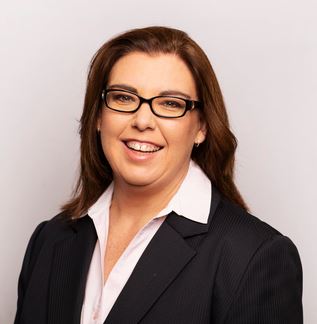Michelle Trudgett

A leader of our time
2019 UNE Distinguished Alumni Award Winner
Visionary is a word often used to describe Wiradjuri woman Michelle Trudgett. Well before she had enrolled to study at UNE she had set herself the goal of gaining three degrees by the time she reached 33; then her ambition was to be appointed a Professor before turning 40; then to assume the role of Pro Vice-Chancellor by the age of 45.
That she has achieved all three goals with one year's grace comes as no surprise to those who know Michelle. One colleague describes her as a "force of nature"; another "a fierce advocate for Indigenous education, who not only imagines a better future for Aboriginal and Torres Strait Islander peoples, but ... makes it happen".
And it's a journey that began in 1997 when she left her Sydney home for UNE's country campus, to take up the study of psychology. "I soon fell in love with Indigenous Studies, and thought it much better that I learn more about my people, history and culture," says Michelle, who went on to complete a Bachelor of Arts (Aboriginal Studies), a Master of Professional Studies and then a Doctor of Education. It was her doctoral thesis that would set the stage for the impressive research and academic career to follow.
"I only knew of two other Indigenous Higher Degree Research (HDR) students at UNE at the time," says Michelle. "In the year that I was born there wasn't a single Indigenous person with a doctoral qualification in Australia and the first one wasn't until 1980. There was a significant gap in knowledge about how Indigenous HDR students could be supported by our institutions, so I decided to investigate the support provided to Indigenous postgraduate students as my doctoral thesis topic."
This ground-breaking study has since informed national policy and guided government and university practices alike. "When I started, most researchers were still focusing on how to get Indigenous people into undergraduate studies, but there wasn't much thinking about options for this cohort once they completed their undergraduate qualification," Michelle says.
It's a question she has investigated thoroughly on her way to becoming one of Australia’s leading Indigenous scholars and finest researchers in Aboriginal and Torres Strait Islander education. Her research has explored Indigenous education at all levels, building to two current projects exploring Indigenous leadership in higher education and the development of Indigenous early career researchers.
"Making higher education more accessible and supporting Indigenous Australians to achieve excellence are key," Michelle says.
And that she has, leading by example. Michelle was the inaugural Indigenous Postdoctoral Research Fellow at Macquarie University and soon developed a highly popular Master of Indigenous Education degree. She moved quickly through the ranks at Warawara, Macquarie's Department of Indigenous Studies, becoming head of the department in just three years, and actively encouraged all administration staff to enrol in degrees "to give them room to move in their future careers".
"I have no time for deficit education; Aboriginal people are able to achieve and succeed at any level," Michelle says. "We are proud, strong and intelligent people and it's important that everything we ask of our Indigenous staff and students is centred around achievement and high expectations."
In 2015 Michelle (by then a Professor of Indigenous Education) was appointed the inaugural Director of the University of Technology Sydney's Centre for the Advancement of Indigenous Knowledges, now regarded as one of Australia's most respected Indigenous research centres. The subject she introduced – Aboriginal Sydney Now – provides almost 1000 students each year with a better understanding of contemporary Indigenous culture.
Last year Michelle's outstanding leadership in Indigenous Education was recognised when she was named the 2018 National NAIDOC Scholar of the Year. She was also awarded the Neville Bonner National Teaching Award for Indigenous Education.
Now Pro Vice-Chancellor Aboriginal and Torres Strait Islander Education, Strategy and Consultation at the Western Sydney University, Michelle is implementing her grand plan to encourage the growth in Indigenous academic employment and higher degree research, as well as the incorporation of Indigenous Knowledges across all aspects of university core business. And, yes, she achieved this appointment at the age of 44.
"It's absolutely imperative to have Indigenous people – the key stakeholders – involved in the decision-making that affects them, whether it be policy or strategy," Michelle says. "My hope is that we will see more Indigenous people holding university executive appointments. With Indigenous people making up 3% of the Australian population, we should already have at least one Indigenous Vice-Chancellor across our 40 universities. There are none, and I want to change that.
"We have Indigenous surgeons, lawyers and judges, but there is this big void in the higher education sector. Future Indigenous scholars need to see Indigenous people succeeding, leading research and influencing policy. Both Indigenous and non-Indigenous people can benefit from Indigenous leadership styles; it's important for improving Indigenous communities, but also important to the socio-economic fabric of Australia.
"Having an Indigenous Vice-Chancellor would signal that we have moved away from notions of universities as western institutions and towards them being global institutions. One can only try."

